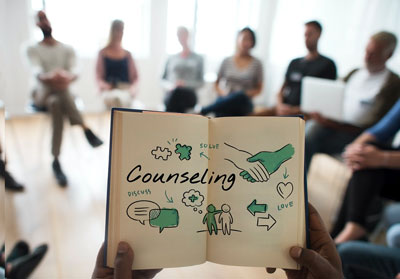Group Therapy
Another effective psychotherapy involves treating a small number of clients (4-8) together as a group. This context can be a powerful environment for change, self-examination and development of interpersonal skills. One may choose to join group therapy to supplement individual, couple or family therapy, to provide additional support, or as the sole component or healing work. No matter what it is that needs to be addressed in therapy, group therapy provide the opportunity to share a healing journey and experiences with other members. Many attending group therapy report that it is a way to know that they “are not alone” and that there are others, with similar experiences, who can be supportive of them.
In group therapy meetings, members learn with and from others. Members are encouraged to talk with each other in a spontaneous and honest fashion. A professionally, trained group therapist helps explore issues or concerns and guides the discussion. Learning to express one’s thoughts, feelings, behaviors, ideas, and problems in a safe setting, leads to improved interpersonal relationships. Some of the issues addressed in group therapy include:
- Anxiety and depression
- Childhood concerns
- Communications skills
- Interpersonal relationships
- Lifestyle choices
- Loss
- Parenting
- Transitions
To address these issues, therapy groups set guidelines to provide enough structure and space to allow members to talk through issues together. Groups are either “open” for anyone to attend or they are “closed” — meaning only a select group of people attend. A closed group will usually have interviews and time commitments to increase chances the group will work well together. Likewise, some groups meet for a set amount of time (usually once per week) for a certain number of weeks. On the other hand, some groups may meet on an on-going basis without an end date selected. Most groups are led by one or two people, often a licensed marriage and family therapist. All these details will matter when you are considering participating in a group therapy experience.
The psychotherapeutic group differs from self-help or peer groups in that in addition to providing help with problems, it affords the opportunity to get along better with others and to provide change and growth.


